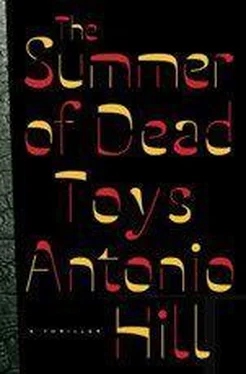Antonio Hill - The Summer of Dead Toys
Здесь есть возможность читать онлайн «Antonio Hill - The Summer of Dead Toys» весь текст электронной книги совершенно бесплатно (целиком полную версию без сокращений). В некоторых случаях можно слушать аудио, скачать через торрент в формате fb2 и присутствует краткое содержание. Жанр: Триллер, на английском языке. Описание произведения, (предисловие) а так же отзывы посетителей доступны на портале библиотеки ЛибКат.
- Название:The Summer of Dead Toys
- Автор:
- Жанр:
- Год:неизвестен
- ISBN:нет данных
- Рейтинг книги:4 / 5. Голосов: 1
-
Избранное:Добавить в избранное
- Отзывы:
-
Ваша оценка:
- 80
- 1
- 2
- 3
- 4
- 5
The Summer of Dead Toys: краткое содержание, описание и аннотация
Предлагаем к чтению аннотацию, описание, краткое содержание или предисловие (зависит от того, что написал сам автор книги «The Summer of Dead Toys»). Если вы не нашли необходимую информацию о книге — напишите в комментариях, мы постараемся отыскать её.
The Summer of Dead Toys — читать онлайн бесплатно полную книгу (весь текст) целиком
Ниже представлен текст книги, разбитый по страницам. Система сохранения места последней прочитанной страницы, позволяет с удобством читать онлайн бесплатно книгу «The Summer of Dead Toys», без необходимости каждый раз заново искать на чём Вы остановились. Поставьте закладку, и сможете в любой момент перейти на страницу, на которой закончили чтение.
Интервал:
Закладка:
Then the idea came to her, and although it was something she wasn’t altogether comfortable with, she decided to carry it out. Surely Héctor wouldn’t mind her going into his home? She went to the kitchen, emptied half of the gazpacho into a clean jug, grabbed the keys of her neighbor’s flat and went to the door. Seeing the stairs she was tempted to turn back, but spurred on by goodwill, and partly out of boredom, she embarked on her journey with the jug in her hand. This staircase smelled strange, she told herself as she passed the next landing. Closed up, or rotten. She’d been losing her sense of smell for years, but something definitely smelled foul nearby. It had happened before: some little creature crept into the empty apartment and died there. She kept going up, slowly, because she wasn’t in a hurry, and arrived at the third-floor door. A second later, feeling a little like a nosy neighbor, she was inside the flat.
The layout was basically identical to that of her own flat, so although the blinds were lowered she moved in the direction of the kitchen without turning on the light. The fridge, empty as a brothel in Lent, received the jug with a purr of satisfaction. Carmen closed it and was already leaving the kitchen when she heard a noise coming from the master bedroom. As if the door had slammed due to the wind. But there was no draught, she told herself. There wasn’t the slightest breeze in this flat of closed windows. Out of curiosity, she crossed the dining room and stood in front of the large bedroom. The door was indeed closed. She turned the knob slowly and then pushed the door lightly. It opened wide.
She stumbled over something she couldn’t identify, a hard edge. Through the cracks in the blind a little light was coming in, so she pushed the switch to turn on the overhead light, but on touching it her fingers didn’t encounter the plastic expected, but a hand leaning on hers. She jumped backward, suddenly aware that someone was there, but at the same time frightened enough that the fear impeded her reactions. She remained still, seeing a dark silhouette emerge from the shadows. She would have screamed, however useless it might have been, if her voice would come out, but her vocal cords were paralysed. Like her.
A second later Carmen closed her eyes and raised her arm in a childish attempt to protect herself from that black figure brandishing some kind of long stick. The first blow fell on her shoulder and forced her to lower her arm with a groan of pain. The second plunged her into a bottomless abyss.
28
Héctor and Leire had left the Martís’ flat and were now facing the intense midday heat punishing the centre of Barcelona. There was no shade: it was a clear, stifling day. One of those days in which the city shone with untinted brilliance, like a Technicolor set inhabited almost exclusively by tourists in shorts and caps, armed with digital cameras and street maps. While they walked slowly down Rambla Catalunya, Héctor thought about the last moments in the Vía Augusta flat: the Roviras, including Aleix, had left before them and the Castells delayed very little before doing the same. It was clear no one felt comfortable. Salvador Martí was the only person who appeared not to understand the suspicions underlying every expression of condolence, every “I’m sorry,” the apprehension with which Enric Castells gave his hand, the sidelong glances between Glòria and Señora Rovira. Regina, for her part, had refused to come out of her room or receive anyone in it, despite the other two women knocking at her door.
The avenue’s terraces invited them to sit down, although deep inside they both knew air conditioning, at that time, was the only refuge from the heat. However, the street gave them privacy in which to discuss the latest details of the case. Once seated at a table, and with two iced coffees in front of them, Héctor brought Leire up to speed on his conversations with Fèlix Castells and Regina Ballester, although out of caution he kept the fact that Savall’s name had come up again to himself. She, for her part, recounted to Salgado her chat with Aleix Rovira and her renewed impression that this boy, like Gina before, was hiding something important from them.
“Notice how every thread in this case comes back to two names?” asked Héctor when she’d finished. “As if we were moving along parallel lines. On one hand Aleix, friend of everyone, Regina’s lover, born manipulator; and on the other this Iris. . even though she’s dead.”
Leire nodded. Despite the heat, her brain was working at top speed.
“There’s something weird. Marc remembered all this while he was in Dublin. Why? And who sent this email to Joana Vidal?”
Héctor was starting to have vague suspicions relating to those questions.
“Iris Alonso had a younger sister. Inés, I think she’s called.” He let out an exasperated snort. “Tomorrow we’ll get rid of doubts. Today we must concentrate on the other lead.”
“Aleix.” Leire took a few seconds before continuing. “One thing is clear: if Regina was with him yesterday afternoon, according to what she told you herself just now, Aleix couldn’t have gone to Gina’s house.”
The inspector nodded.
“You know what? The worst thing about all this is that I can’t imagine anyone in this case as a killer. They’re all too educated, too proper, too worried about appearances. If one of them killed Marc and then Gina, it had to have been with a very powerful motive. A very deep hatred or an uncontrollable terror.”
“Which brings us back to Iris. . If she simply drowned in the pool, if her death was an accident, none of this makes sense.” Leire remembered Father Castells’ face in the café. “But we only have the priest’s word on that.”
Héctor looked her in the eyes.
“I know what you’re thinking, but I think we shouldn’t get ahead of ourselves.”
“Have you read the rest of the blog, Inspector? In his last entries Marc keeps talking about justice, the end justifying the means, it not being long before the truth comes out.”
“And in his last email to his mother he commented that he had to take care of an important matter in Barcelona. Something he had to resolve. Something certainly linked to Iris’s death.”
“When you spoke of parallel lines, I think you forgot one, Inspector. The exact one which crosses in the middle. The only name that appears in both cases.” Leire’s voice took on a hard tone, devoid of any sympathy. “Father Fèlix Castells.”
No doubt she was right, thought Héctor. And his impression that the priest was hiding something came back even more forcefully.
“If that’s what we’re dealing with, the matter might take a very ugly turn.”
“Think about it. All the details about Iris, the anorexia, the sudden personality change, totally fit the profile of a victim of sexual abuse. Marc was only a child that summer, but maybe in Dublin he began to remember, for whatever reason, and came to the same conclusion as we have now.”
Héctor finished the reasoning.
“And returned to Barcelona ready to untangle the truth. But how? Did he openly accuse his uncle?”
“Maybe he did. Maybe he went to see him. Maybe Father Castells got frightened and decided to do away with his nephew.”
The argument had an overwhelming logic. But logic, as always, left feelings to one side.
“Let’s not forget they loved each other,” replied Salgado. “Marc had lived with a distant father-and believe me when I tell you I know what that is-and then found himself in a new family in which he was relegated to second place. His uncle had been a kind of ‘substitute mother.’ He must have been very sure of what he suspected to dare to betray him. And on the other hand, this man loved his nephew as a son. I’m sure of that. He’d cared for him, raised him. . You can’t kill a son, whatever you do.”
Читать дальшеИнтервал:
Закладка:
Похожие книги на «The Summer of Dead Toys»
Представляем Вашему вниманию похожие книги на «The Summer of Dead Toys» списком для выбора. Мы отобрали схожую по названию и смыслу литературу в надежде предоставить читателям больше вариантов отыскать новые, интересные, ещё непрочитанные произведения.
Обсуждение, отзывы о книге «The Summer of Dead Toys» и просто собственные мнения читателей. Оставьте ваши комментарии, напишите, что Вы думаете о произведении, его смысле или главных героях. Укажите что конкретно понравилось, а что нет, и почему Вы так считаете.












